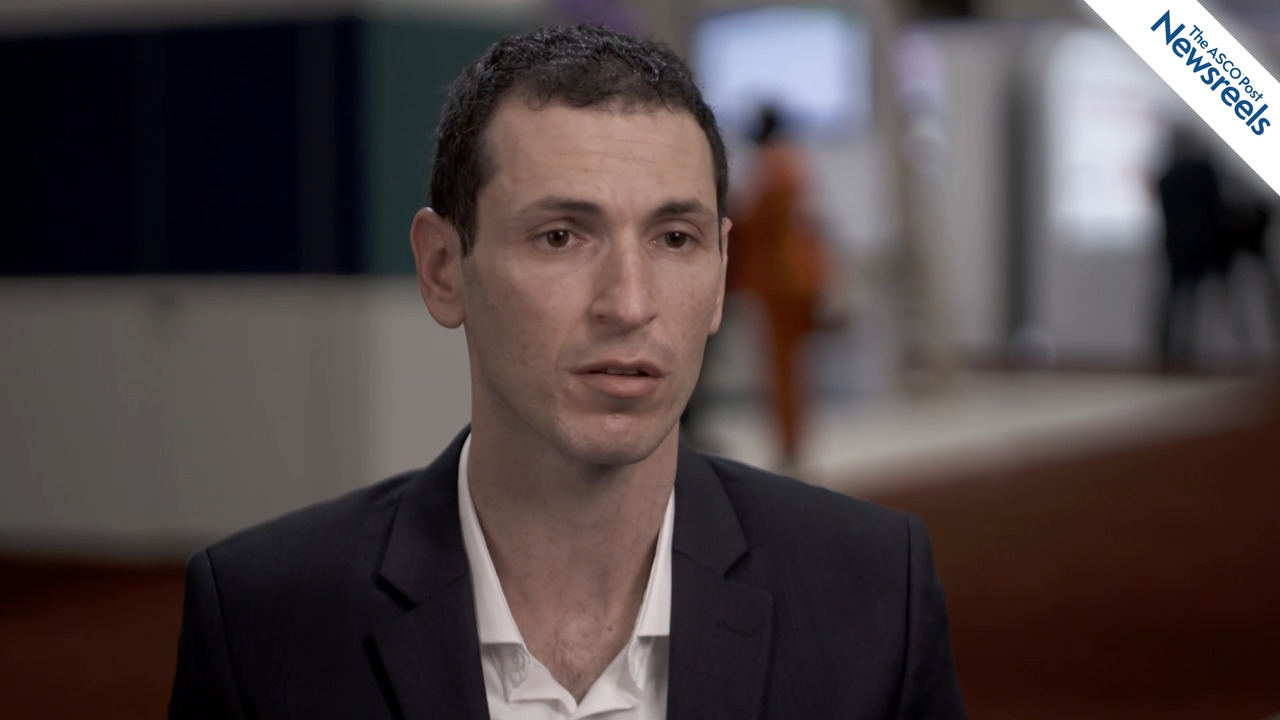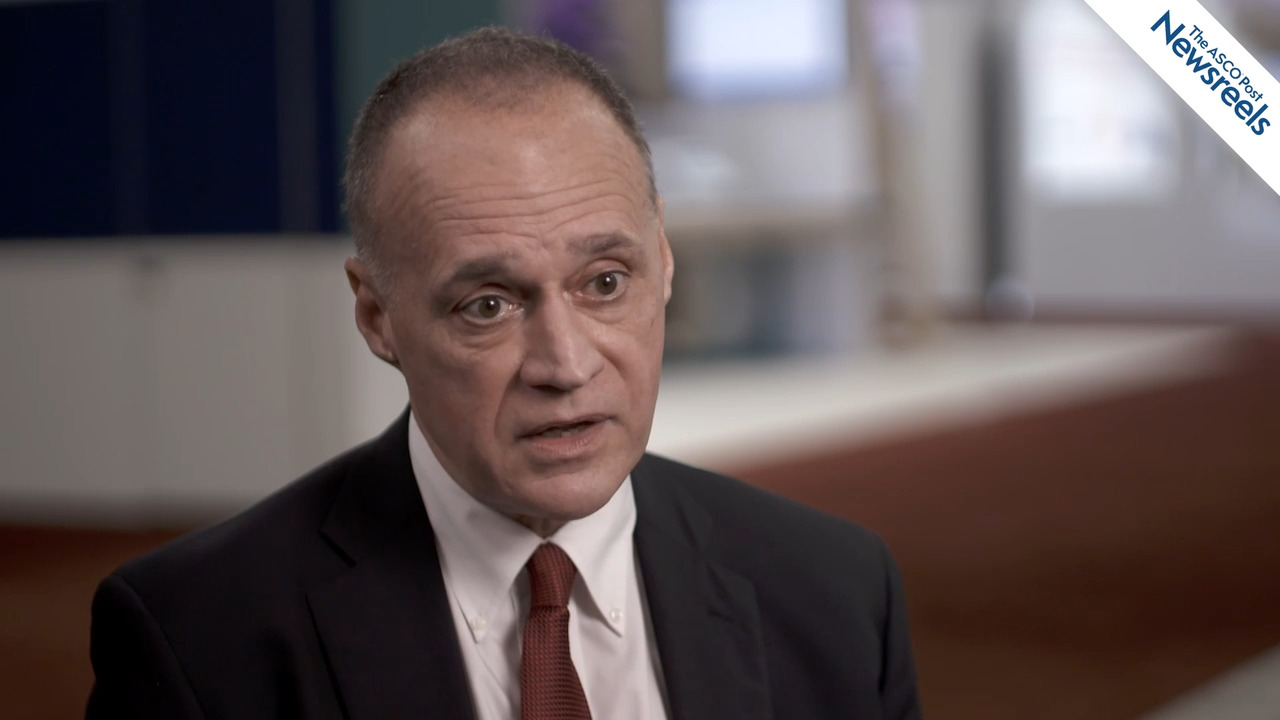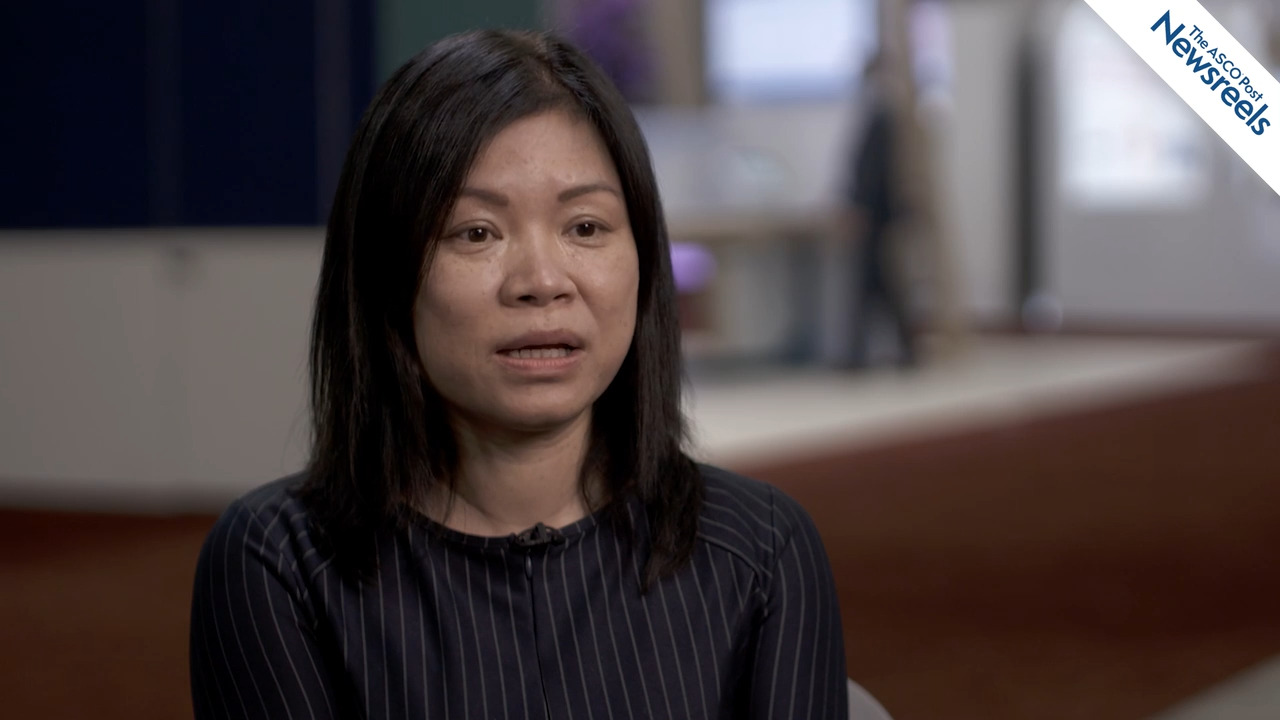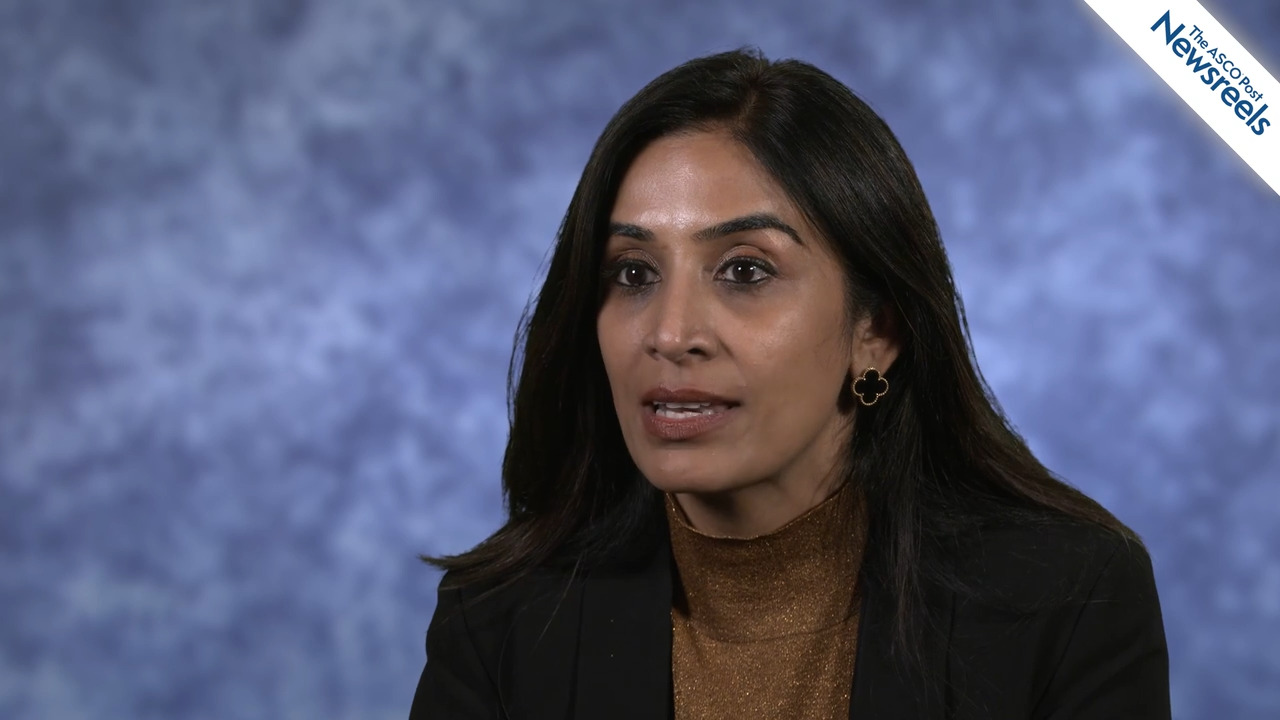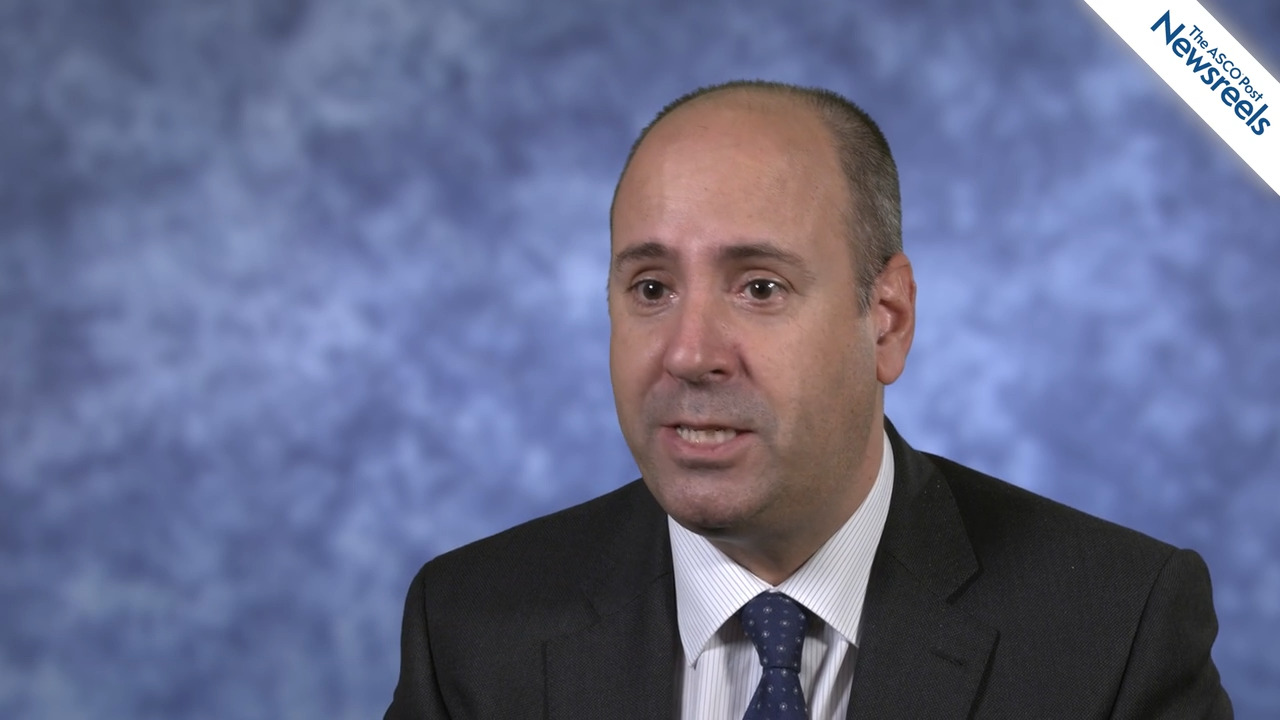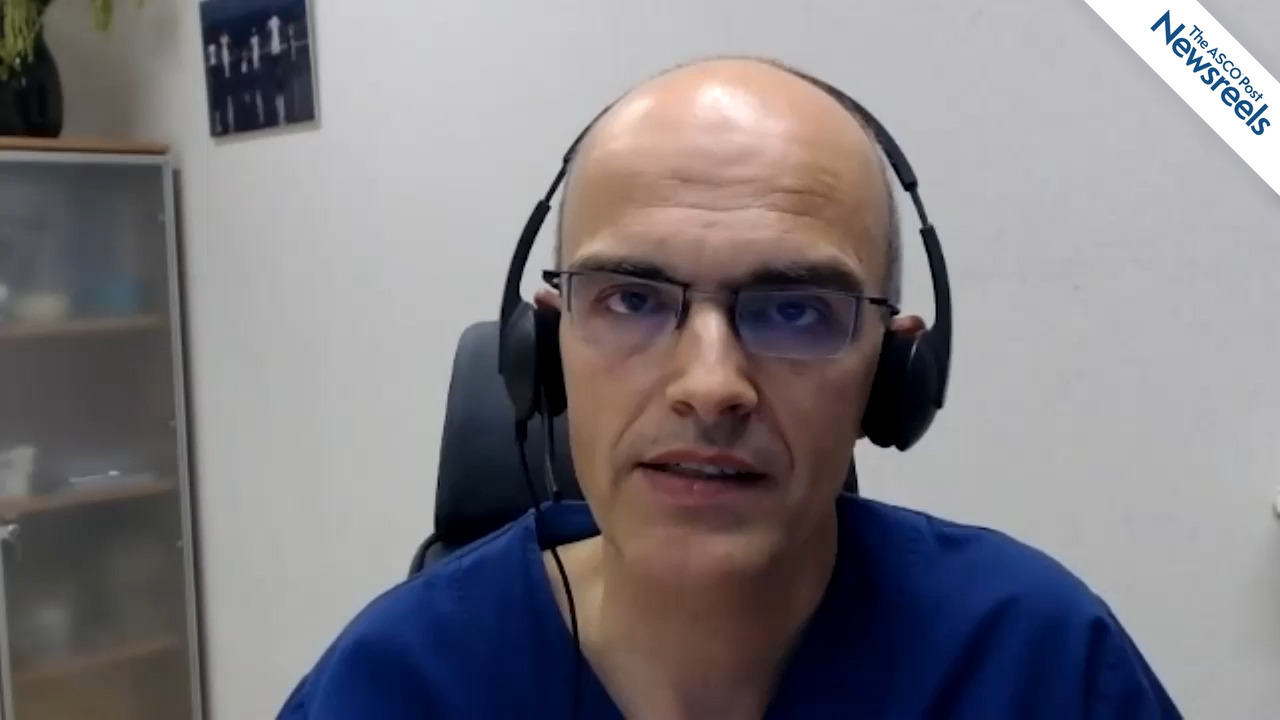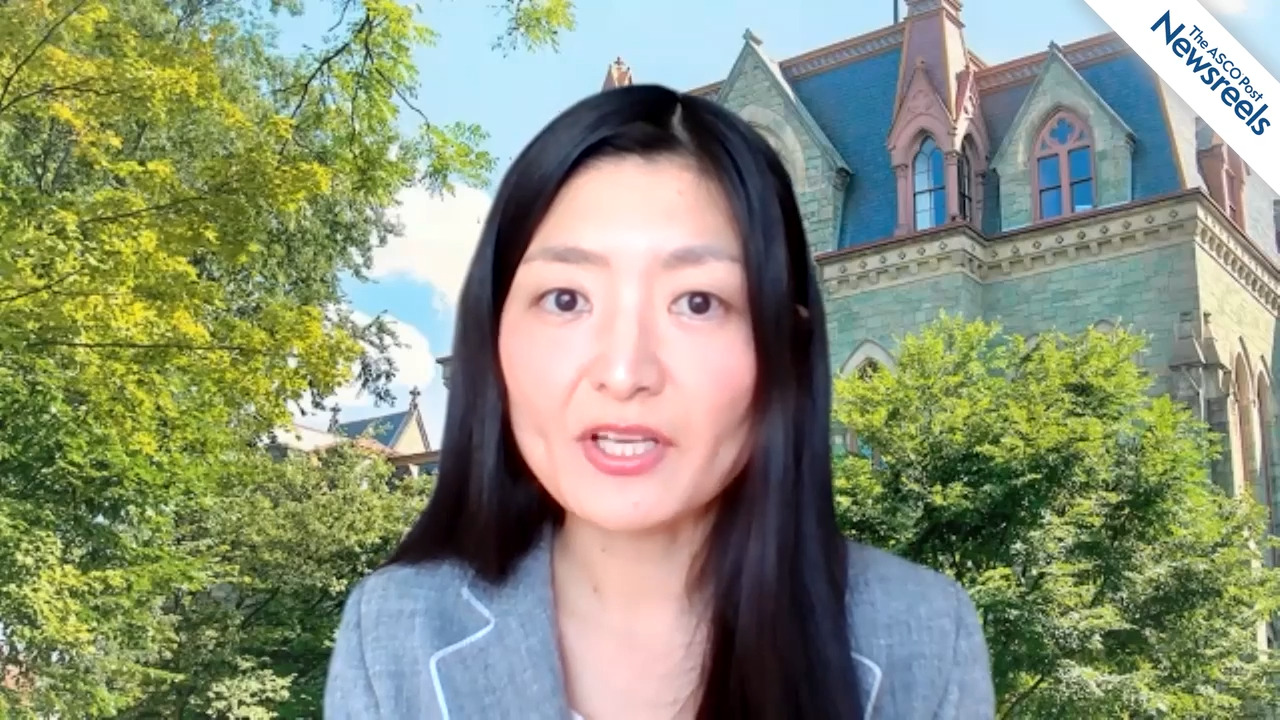Roni Shouval, MD, PhD, on TP53-Mutant Large B-Cell Lymphoma and CAR T-Cell Therapy
Roni Shouval, MD, PhD, of Memorial Sloan Kettering Cancer Center, discusses his findings, which show, for the first time, that TP53 alterations are a valuable prognostic and potentially predictive marker in patients with large B-cell lymphoma who receive CD19–CAR T-cell therapy. Gene-expression profiling suggests that TP53 alterations result in an immunosuppressive tumor microenvironment and impaired apoptosis signaling, which could lead to decreased CAR T-cell therapy efficacy (Abstract 710).
Michael R. Bishop, MD, on Aggressive B-Cell NHL: Tisagenlecleucel vs Standard of Care as Second-Line Therapy
Michael R. Bishop, MD, of the University of Chicago, discusses insights from findings of the phase III BELINDA study, which may inform the design of future CAR T-cell trials, as well as the use of second-line tisagenlecleucel therapy in patients with relapsed or refractory aggressive B-cell non-Hodgkin lymphoma (Abstract LBA-6).
ZUMA-5 Trial: Axicabtagene Ciloleucel in Relapsed or Refractory Indolent Non-Hodgkin Lymphoma
As reported in The Lancet Oncology by Caron A. Jacobson, MD, and colleagues, the phase II ZUMA-5 trial showed that axicabtagene ciloleucel, an autologous anti-CD19 chimeric antigen receptor (CAR) T-cell therapy, produced high rates of durable responses in patients with relapsed or refractory...
Study Examines a Potential Approach to Mitigate CAR T-Cell Therapy Toxicity
Research demonstrating a novel approach that may reduce cytokine-release syndrome associated with chimeric antigen receptor (CAR) T-cell therapy was presented by Marcela Maus, MD, PhD, and colleagues at the 2021 American Society of Hematology (ASH) Annual Meeting & Exposition (Abstract 1723)...
Composite Biomarker Needed to Predict Benefit of Immunotherapy in Triple-Negative Breast Cancer
Although there is a biomarker that predicts response to the one approved immunotherapy agent for metastatic triple-negative breast cancer, “it is important to note there are no biomarkers of response to neoadjuvant immunotherapy in early-stage triple-negative breast cancer,” Elizabeth A....
BELINDA Study: Second-Line Tisagenlecleucel Equivalent to Standard of Care for Relapsed or Refractory Aggressive B-Cell Non-Hodgkin Lymphoma
In an analysis of the phase III BELINDA trial presented by Bishop et al during the 2021 American Society of Hematology (ASH) Annual Meeting & Exposition (Abstract LBA-6), the chimeric antigen receptor (CAR) T-cell therapy tisagenlecleucel was not found to improve event-free survival over the...
Study Suggests Lack of Benefit With the Addition of Immune Checkpoint Inhibition to Chemotherapy in Low PD-L1–Expressing Gastric or Esophageal Adenocarcinoma
In an analysis reported in the Journal of Clinical Oncology, Zhao et al found that the addition of an immune checkpoint inhibitor to chemotherapy in trials of first-line treatment of advanced gastric or esophageal adenocarcinoma was not associated with benefit in low PD-L1–expressing subgroups not...
Immune Checkpoint Inhibitor Treatment in Patients Aged 65 and Older With Advanced Melanoma: Association Between Sex and Survival
In a study reported in JAMA Network Open, Jang et al found that women with advanced melanoma receiving combination immune checkpoint inhibitor therapy with nivolumab/ipilimumab as their most recent immune checkpoint inhibitor therapy (all with prior ipilimumab treatment) had a poorer survival...
L. Elizabeth Budde, MD, PhD, on Relapsed/Refractory Follicular Lymphoma: Early Results on Mosunetuzumab Monotherapy
L. Elizabeth Budde, MD, PhD, of City of Hope, discusses phase I/II findings that showed mosunetuzumab monotherapy induces deep and durable remissions in patients with relapsed or refractory follicular lymphoma who have received two or more prior lines of treatment, including those with double-refractory disease. Because follicular lymphoma is associated with frequent relapses and decreasing progression-free intervals with successive lines of conventional therapy, these data are encouraging (Abstract 127).
Isatuximab/RVd Meets Primary Endpoint of MRD Negativity for Newly Diagnosed, Transplant-Eligible Patients With Multiple Myeloma
For the first-line treatment of newly diagnosed, transplant-eligible patients with multiple myeloma, the achievement of measurable residual disease (MRD) negativity was significantly greater when the anti-CD38 monoclonal antibody isatuximab was added to the standard three-drug induction regimen of...
Komal Jhaveri, MD, on Triple-Negative and Metastatic Breast Cancers: New Data on Neratinib, Fulvestrant, and Trastuzumab
Komal Jhaveri, MD, of Memorial Sloan Kettering Cancer Center, discusses the latest updates from the SUMMIT trial, which explored the combinations of neratinib/fulvestrant/trastuzumab and neratinib plus trastuzumab, as well as fulvestrant alone. The combination regimens appeared to benefit patients with hormone–receptor positive, HER2-mutated metastatic breast cancer who have had prior exposure to CDK4/6 inhibitors, and those with HER2-mutated triple-negative disease (Abstract GS4-10).
TRANSFORM Trial: Lisocabtagene Maraleucel vs Standard of Care for Relapsed or Refractory Large B-Cell Lymphoma
An interim analysis of the TRANSFORM trial comparing the chimeric antigen receptor (CAR) T-cell immunotherapy lisocabtagene maraleucel to standard of care found that the CAR T-cell therapy significantly improved event-free survival for patients with large B-cell lymphoma that persisted or returned...
Activity of Mosunetuzumab in Pretreated Patients With Relapsed or Refractory Follicular Lymphoma
The bispecific antibody mosunetuzumab achieved deep and durable remissions as monotherapy in patients with relapsed or refractory follicular lymphoma who had received two or more prior lines of therapy, according to pivotal results of a phase I/II trial presented at the 2021 American Society of...
Javier Cortés, MD, PhD, on Previously Untreated Triple-Negative Breast Cancer: Pembrolizumab Plus Chemotherapy
Javier Cortés, MD, PhD, of the International Breast Cancer Center, discusses the final phase III results of KEYNOTE-355, which showed that pembrolizumab and chemotherapy improved overall and progression-free survival, compared with placebo and chemotherapy, for patients with previously untreated, locally recurrent, inoperable or metastatic triple-negative breast cancer (Abstract GS1-02 ).
Long-Term Outcomes From CheckMate 067: Nivolumab/Ipilimumab, Nivolumab, or Ipilimumab in Advanced Melanoma
In a 6.5-year update of the phase III CheckMate 067 trial reported in the Journal of Clinical Oncology, Jedd D. Wolchok, MD, PhD, FASCO, and colleagues provided long-term overall survival as well as melanoma-specific survival findings among patients with advanced melanoma who received nivolumab...
Adding Pembrolizumab to Chemotherapy Improves Overall and Progression-Free Survival in First-Line Treatment of Advanced Esophageal Cancer
As reported in The Lancet by Jong-Mu Sun, MD, of Samsung Medical Center, Sungkyunkwan University, Seoul, and colleagues, an interim analysis in the phase III KEYNOTE-590 trial has shown that the addition of first-line pembrolizumab to chemotherapy resulted in improved overall and progression-free...
Peter Schmid, MD, PhD, on Early-Stage Triple-Negative Breast Cancer: Neoadjuvant Treatment With Pembrolizumab and Chemotherapy
Peter Schmid, MD, PhD, of Barts Cancer Institute, discusses phase III findings from KEYNOTE-522, in which researchers found a generally consistent event-free survival benefit among patients with early-stage high-risk triple-negative breast cancer who were treated with neoadjuvant pembrolizumab plus chemotherapy followed by adjuvant pembrolizumab (Abstract GS1-01).
Single-Cell Spatial Analysis May Help to Predict Response to Neoadjuvant Atezolizumab in Patients With Triple-Negative Breast Cancer
A next-generation technology that allows the study of protein expression at the single-cell level and the location of the cells within the tumor microenvironment was feasible and provided information on the benefit of adding the immune checkpoint inhibitor atezolizumab to chemotherapy as...
KEYNOTE-355 Final Analysis Reveals Survival Benefit With Pembrolizumab in Triple-Negative Breast Cancer
The final overall survival results from the KEYNOTE-355 study showed a statistically significant 27% reduction in the risk of death for patients with metastatic triple-negative breast cancer whose tumors were strongly positive for PD-L1, defined as a combined positive score (CPS) of at least 10 and ...
FDA Approves Pembrolizumab for the Adjuvant Treatment of Stage IIB or IIC Melanoma
On December 3, the U.S. Food and Drug Administration (FDA) approved pembrolizumab (Keytruda) for the adjuvant treatment of adult and pediatric patients aged 12 years and older with stage IIB or IIC melanoma following complete resection. KEYNOTE-716 Efficacy was evaluated in KEYNOTE-716, a...
Jeffrey Weber, MD, PhD, on Coronavirus, Cancer, and Immunotherapy: Navigating Clinical Trials and Treatment
Jeffrey Weber, MD, PhD, of NYU Langone Medical Center, offers his perspective on the impact of the COVID-19 pandemic on oncology care and cancer clinical trials, as clinicians strive to provide optimal treatment to patients while reducing their risk of contracting the coronavirus. The steep decline in trial enrollment has recovered, with many of the changes in how research was conducted as a result of the pandemic still in place and improving the process going forward.
Vidutolimad Plus Pembrolizumab in PD-1 Refractory Melanoma
The addition of vidutolimod to pembrolizumab could help overcome resistance to immune checkpoint inhibition in patients with metastatic or unresectable cutaneous melanoma, according to data presented by John M. Kirkwood, MD, and colleagues at the Society for Immunotherapy of Cancer (SITC) 2021...
Sotigalimab Plus Nivolumab in Anti–PD-1/PD-L1–Refractory Melanoma
Immune checkpoint inhibitors have revolutionized the treatment of metastatic melanoma, but a significant number of patients still fail to respond to anti–PD-1 therapy. The novel combination of sotigalimab, an anti-CD40 monoclonal antibody, and the PD-1 inhibitor nivolumab could help address this...
Study Examines Safety and Efficacy of Retifanlimab in Recurrent MSI-H/dMMR Endometrial Cancer
The novel PD-1 inhibitor retifanlimab appears to be safe and effective in patients with pretreated, recurrent microsatellite instability–high (MSI-H) or deficient mismatch repair (dMMR) endometrial cancer, according to according to data presented by Berton-Rigaud et al at the Society for...
Novel Vaccine Platform Plus Pembrolizumab May Boost Immune Response in Advanced HCC
A novel vaccine platform administered in combination with pembrolizumab appears to be safe and effective in patients with advanced hepatocellular carcinoma (HCC), according to data presented by Mark Yarchoan, MD, and colleagues at the Society for Immunotherapy of Cancer (SITC) 2021 Annual Meeting...
John M. Kirkwood, MD, on Melanoma: Early Study Results on Vidutolimod and Pembrolizumab
John M. Kirkwood, MD, of the University of Pittsburgh Medical Center, discusses phase Ib findings on the combination of vidutolimod plus pembrolizumab, as well as vidutolimod monotherapy, both of which showed clinical activity in patients with PD-1 blockade–refractory melanoma. The duration of response with the combination therapy was substantially longer. Phase II studies are ongoing (Abstract 950).
Next-Generation Sequencing of Bone Marrow DNA to Predict Relapse Following CAR T-Cell Therapy in Patients With ALL
Next-generation sequencing of bone marrow samples from pediatric and young adult patients with acute lymphoblastic leukemia (ALL) treated with tisagenlecleucel was more accurate in predicting relapse than flow cytometry and monitoring of B-cell aplasia, according to the results from a study by...
FDA Approves Rituximab Plus Chemotherapy for Several Pediatric Hematologic Malignancies
On December 2, the U.S. Food and Drug Administration (FDA) approved rituximab (Rituxan) in combination with chemotherapy for pediatric patients (≥ 6 months to < 18 years old) with previously untreated, advanced-stage, CD20-positive diffuse large B-cell lymphoma (DLBCL), Burkitt lymphoma,...
Hannah E. Dzimitrowicz, MD, on COVID-19 Vaccination in Patients With Cancer Receiving Immune Checkpoint Inhibitors
Hannah E. Dzimitrowicz, MD, of Duke Cancer Center, discusses study results showing that in patients with melanoma and renal cell cancer receiving immune checkpoint inhibitor therapy, the COVID-19 vaccination appears to be well tolerated and safe. A higher rate of post-vaccination symptoms reported in these patients is likely related to more frequent visits compared with controls (Abstract 625).
Hans Wildiers, MD, on Metastatic Breast Cancer: Comparing Addition of Eftilagimod Alpha vs Placebo to Paclitaxel
Hans Wildiers, MD, of University Hospitals Leuven, discusses the final results from the phase IIb AIPAC study, which suggested that eftilagimod added to paclitaxel may be of benefit to patients older than 65 years with hormone receptor–positive, HER2-negative metastatic breast cancer after endocrine-based therapy. Eftilagimod, which is a first-in-class antigen presenting cell activator, appeared to increase circulating CD4/CD8 T cells, which correlated to improved overall survival (Abstract 948).
Yuki Muroyama, MD, PhD, on A Novel Marker of Clinical Response to PD-1 Blockade Under Study
Yuki Muroyama, MD, PhD, of the University of Pennsylvania Perelman School of Medicine, discusses the interaction between the immune system and a novel marker—T-cell DNA damage and repair response—to understand how that interaction may affect immune cell biology and therapeutic response (Abstract 310).
Keith T. Flaherty, MD, on Results From the DREAMseq Trial
Invited discussant of the phase III DREAMseq trial, Keith T. Flaherty, MD, said the findings still leave room for nuanced decision-making.1 Dr. Flaherty is Professor of Medicine at Harvard and Director of the Henri and Belinda Termeer Center for Targeted Therapy at the Massachusetts General...
DREAMseq Trial: In Advanced Melanoma With BRAF Mutations, Start With Immunotherapy
In the treatment of patients with advanced melanoma containing BRAF mutations, initial treatment with an immunotherapy combination achieved superior overall survival compared with targeted therapy in the phase III DREAMseq trial, also known as the ECOG-ACRIN EA6134 trial. The results were reported ...
Immunomodulatory Effects of Neoadjuvant Nivolumab, Chemotherapy in NSCLC
The immunomodulatory effects of neoadjuvant immune-based treatments for non–small cell lung cancer (NSCLC) are becoming clearer, in part due to data presented by Schmidt et al at the Society for Immunotherapy of Cancer (SITC) 2021 Annual Meeting (Abstract 962). The first integrated analysis of...
Neoadjuvant Chemoradiation Plus Pembrolizumab Shows No Effect on Tumor-Infiltrating Lymphocytes in Pancreatic Cancer
The addition of the checkpoint inhibitor pembrolizumab to neoadjuvant chemoradiation has failed to overcome the immunosuppressive microenvironment of pancreatic cancer, according to data presented by Osama E. Rahma, MD, and colleagues at the Society for Immunotherapy of Cancer (SITC) 2021 Annual...
Eftilagimod Alpha Plus Paclitaxel May Improve Survival in HR-Positive, HER2-Negative Metastatic Breast Cancer: AIPAC Trial
The addition of the LAG-3 protein eftilagimod alpha to paclitaxel led to a significant improvement in overall survival in younger patients with hormone receptor (HR)-positive, HER2-negative metastatic breast cancer, according to data presented by Hans Wildiers, MD, and colleagues at the Society for ...
Phase I Trial Investigates HER-Targeted CAR-M for HER2-Overexpressing Solid Tumors
HER2-targeted chimeric antigen receptor macrophages (CAR-M) could be the next cell therapies to treat advanced solid tumors overexpressing HER2, according to data presented by Kim A. Reiss, MD, and colleagues at the Society for Immunotherapy of Cancer (SITC) 2021 Annual Meeting (Abstract 951)....
Can Antihistamines Influence Response to Immunotherapy?
New research from The University of Texas MD Anderson Cancer Center found that treatment with antihistamines was associated with improved responses to immune checkpoint inhibitors. The preclinical study, published by Li et al in Cancer Cell, demonstrated that the histamine receptor H1 (HRH1) acts...
Response to SARS–CoV-2 mRNA Vaccination in Patients With B-Cell Depletion Associated With CAR T-Cell Therapy
In a small single-institution study reported in a research letter in JAMA Oncology, Parvathaneni et al found that SARS–CoV-2 mRNA vaccination produced antibody responses in nearly half—and CD4 T-cell responses in more than half—of patients with B-cell depletion due to treatment with...
Emily Z. Keung, MD, on Interactions of Sarcoma, Immune Infiltrates, and Checkpoint Blockade
Emily Z. Keung, MD, of The University of Texas MD Anderson Cancer Center, discusses the complex interactions of immune infiltrates and neoadjuvant immune checkpoint blockade (ICB) in patients with resectable soft-tissue sarcoma. These interactions may hold the key to understanding pathologic response to ICB and ICB resistance (Abstract 379).
Kim A. Reiss, MD, on HER2-Overexpressing Solid Tumors: First-in-Human Study of Anti-HER2 CAR Macrophages
Kim A. Reiss, MD, of the University of Pennsylvania, discusses results of a phase I trial of a CAR-M engineered macrophage cancer therapy, known as CT-0508, for patients with solid tumors that overexpress HER2. CAR-M, designed to exploit the natural role of macrophages to initiate an antitumor response, is currently under study at multiple clinical sites (Abstract 951).
Impact of Prior Blinatumomab Exposure on CD19-Targeted CAR T-Cell Therapy Outcomes in Pediatric Patients With B-Cell ALL
In a study reported in the Journal of Clinical Oncology, Myers et al found that lack of response to prior blinatumomab treatment was associated with poorer outcomes with CD19-targeted chimeric antigen receptor (CAR) T-cell therapy (CD19-CAR) in children and young adults with relapsed or refractory...
Stephanie T. Schmidt, PhD, on NSCLC: The Immunomodulatory Impact of Neoadjuvant Chemotherapy and Immune-Based Treatments
Stephanie T. Schmidt, PhD, of The University of Texas MD Anderson Cancer Center, discusses the first integrated examination of the immunomodulatory effects of neoadjuvant chemotherapy, nivolumab, and nivolumab plus chemotherapy in resected non–small cell lung cancer (Abstract 962).
Impact of Time of Day of Immune Checkpoint Inhibitor Infusion on Overall Survival in Patients With Metastatic Melanoma
In a single-institution study reported in The Lancet Oncology, Qian et al found that the administration of immune checkpoint inhibitors after 4:30 PM was associated with poorer overall survival vs infusion earlier in the day in patients with metastatic melanoma. As stated by the investigators, “The ...
Maintenance Daratumumab After Initial Therapy for Transplant-Eligible Multiple Myeloma: More Questions Than Answers From CASSIOPEIA Part 2
Bortezomib, thalidomide, and dexamethasone (VTd) is an acceptable, effective standard-of-care induction treatment in Europe for patients with newly diagnosed myeloma who are eligible for autologous stem cell transplantation. CASSIOPEIA is a two-part, open-label, randomized, phase III trial in...
Maintenance Daratumumab Prolongs Progression-Free Survival in Newly Diagnosed Multiple Myeloma
As reported in The Lancet Oncology by Philippe Moreau, MD, of the University Hospital Hôtel-Dieu, Nantes, and colleagues, an interim analysis of part 2 of the phase III CASSIOPEIA trial has showed significantly prolonged progression-free survival with maintenance daratumumab vs observation...
Adjuvant Immunotherapy: The Next Chapter in Advancements in Renal Cell Carcinoma
Renal cell carcinoma is a common malignancy among men and women in the United States.1 The incidence continues to increase with the ever-increasing use of contemporary medical imaging. Although many patients who present with localized disease are cured with definitive surgery, some patients develop ...
KEYNOTE-564 Trial: Adjuvant Pembrolizumab Improves Disease-Free Survival in High-Risk Renal Cell Carcinoma
As reported in The New England Journal of Medicine by Toni K. Choueiri, MD, of Dana-Farber Cancer Institute, and colleagues, an interim analysis of the phase III KEYNOTE-564 trial has showed improved disease-free survival with adjuvant pembrolizumab vs placebo after nephrectomy in high-risk...
High-Risk Multiple Myeloma: Combination Regimens and CAR T-Cell Therapy
“Continuous improvement is better than delayed perfection.” —Mark Twain To complement The ASCO Post’s extensive coverage of the 2021 ASCO Annual Meeting, here are several abstracts selected from the meeting proceedings focusing on novel treatments under study in high-risk multiple myeloma. For...
CheckMate 743 Supports Survival Benefit of Nivolumab Plus Ipilimumab in Malignant Pleural Mesothelioma
Updated results from the phase III CheckMate 743 trial support the durable and superior benefits of immunotherapy with nivolumab plus ipilimumab over chemotherapy as first-line treatment for patients with unresectable malignant pleural mesothelioma.1 In the most recent updated analysis of the...
